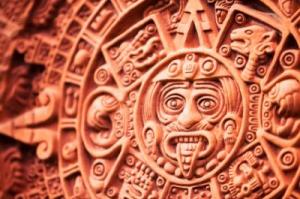Research is shedding light on why people choose to coexist peacefully in societies, even when it means taking a low rung in the social hierarchy, according to a panel of anthropologists and archaeologists who spoke on Feb. 20 at the 2011 AAAS meeting in Washington, D.C.
The panelists explained that the cultural evolution of cooperation results not from large-scale, inevitable processes, but from the sum of many voluntary decisions made in individuals’ best interests.
Speakers explained that civilizations from the Ming Dynasty of China to the Aztecs of Mexico are formed out of negotiations between the rulers and the ruled, and that the specifics of this initial bargaining process can have long-lasting cultural consequences.
“Ultimately,” said David Carballo, an archaeologist at Boston University, “it’s a balance between what leaders say has to happen, and what commoners are actually willing to do.”
The panel concurred that humans were typically motivated to enter these social contracts during crises, or “moments of generative social change,” as UCLA anthropologist Monica Smith described them. During periods of extended famine or political instability, laborers with a diplomatic bent can, in essence, trade social status for economic certainty, as seen in the rise of caste systems in India and West Africa.
Although living in a group may initially be the best option, University of Maine anthropologist Paul Roscoe pointed out that the desires of rulers often diverge from those of the ruled. If, for instance, a military leader wants to compete with neighboring dictators instead of simply defending his citizens against them, the average citizen might see her quality of life degrade, but still be unable to escape her place in society.
“This is the human tragedy,” explained Roscoe. “In order to survive… the body politic ends up exposing itself to exploitation.”
But if emergencies inspire humans to live together, why do the societies we form last long after the danger has passed? Drawing on game theory and computer simulations, speakers showed that hierarchy can be a stable outcome of communal living. Once a social structure is in place, individuals typically benefit from continuing to cooperate.
The transformative cultural effects of this kind of cooperation can also extend far beyond basic political structures. Living in larger societies requires more trust among strangers—an attitude correlated not only with increased trade, but, as shown in a survey of 30 early cultures conducted by Purdue University anthropologist Richard Blanton, several markers of modern thought that include realistic art and the development of theories of virtue.
By discussing and depicting the actions of everyday people, rather than more abstract concepts, artists and philosophers may inspire commoners to view themselves as part of a greater culture.
Although the models put forward in the symposium were developed from pre-modern case studies, speakers explained that humans follow the same decision-making processes across continents and time periods, making the applications to today’s societies clear. Smith pointed to the elaborate rituals and social segregation seen in both caste systems and modern-day street gangs.
Even Italian Prime Minister Silvio Berlusconi’s recent sexual indiscretions were touched upon, as an example of elite exploitative practices. “At least, that is the allegation,” added Roscoe, diplomatically.
Max McClure is a graduating senior at Stanford University, where he studies neurobiology and creative writing. He edits The Claw Magazine, contributes to the Stanford Storytelling Project radio program, is completing an honors thesis on (possibly) autistic mice, and plays banjo in a local bluegrass band. Contact him at mcclure.max16@gmail.com.

